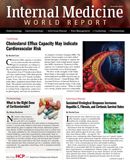Publication
Article
Artificial Sweeteners Linked to Glucose Intolerance
Author(s):
Glucose intolerances may be linked to non-caloric artificial sweeteners, according to research published in Nature.

Non-caloric artificial sweetener (NAS) consumption is linked to dysbiosis and metabolic abnormalities, according to research published in the journal Nature.
A multidisciplinary team of researchers conducted a 10-week study of mice, who received either NAS, water, glucose, or sucrose during the study period. The mice that received water, glucose, or sucrose demonstrated comparable glucose tolerance compared to the NAS mice, which showed glucose intolerance. The mice were fed a high fat diet while receiving NAS or pure sucrose as a control group to simulate findings of obese patients. Mice receiving commercial saccharides developed a glucose intolerance as well.
The researchers performed fecal transplantation to test if gut microbiota mediated NAS-induced glucose intolerance. Microbiota was transferred from mice on normal diet saccharin mice or glucose as a control in the germ-free mice. After 6 days of fecal transplantation, mice on the commercial saccharin diet received microbiota demonstrated impaired glucose intolerance when compared to the glucose mice.
Results concluded consumption of commonly NAS formulas can impact the development of glucose intolerance through induction of compositional and functional alterations in antibiotic treatment. Furthermore, these treatments can be transferred to germ-free populations via fecal transplant or via microbiota anaerobically incubated in the presence of NAS.
The team later examined the effects of NAS on glucose tolerance in 7 healthy volunteers for 7 days. After the observation period, 4 volunteers showed poor glycemic response after the NAS consumption compared to regular sugar consumption.
In a separate, ongoing study, the researchers examined 381 human patients without diabetes. They found a positive association between NAS consumption and metabolic syndrome-related clinical parameters. These included increased weight, increased waist-to-hip ratio, higher fasting blood glucose, glycosylated HbA1c and glucose tolerance test, and elevated serum alanine aminotransferase. A1c levels were increased in participants receiving NAS compared to the control consumers. The A1c increase was significant even after the researchers adjusted for body mass index across the patients.
The researchers believed their data supports a reassessment of massive NAS usage because of their conclusions.
Prior studies have demonstrated positive response to NAS, though some have shown associations between NAS consumption, weight gain, and the development of diabetes. The US Food and Drug Administration has approved 6 NAS products for use, according to this article.






